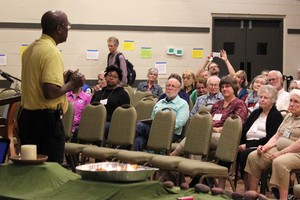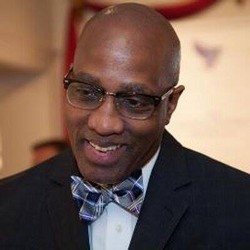Presbyterians cannot solve the world’s environmental issues alone. It will take a unified effort from the privileged, those living in poverty, people of different races and cultures. That was the message from the Rev. Dr. J. Herbert Nelson, II at the Presbyterians for Earth Care 2015 Conference in Montreat, N.C.
Nelson told the crowd that we have been called as caretakers for God’s creation and have been given dominion over land and sea, not domination.
“God has entrusted us as humans with all that God has created, that we might use it in a way that is worthy of all humanity,” he said. “We should not selfishly claim creation for personal gain, profit, corporate greed or to boast of what we have. We ought to respect creation because it is life and gives life.”
Nelson said there are entities around the world that do not share the same concern about the environment even to the point of denying climate change actually exists. But, he adds that the church must reach out to those who suffer the most in order to effectively battle this growing problem.
“I am convinced we have a responsibility as Christians, to stand beside others who struggle in this journey,” he said. “We should be good stewards, caretakers, caregivers and advocates for those who cannot support themselves.”
Nelson said we have allowed racial and cultural divisions to impact the very thing we ought to unite around.

J. Herbert Nelson, II, director of the PC(USA) Office of Public Witness, addresses the Presbyterians for Earth Care 2015 Conference in Montreat. —Rick Jones
“This is a serious and significant time for us to have courage as a denomination, to cross lines of race, and invite people into this movement who are not here tonight,” Nelson said. “I am convinced that a great challenge for church, is to get out of our own denominational silos and reach out to places that others dare not go."
During a question and answer session, Nelson pointed to the out-of-control spending by corporations on presidential elections. He said the best way for everyone to take the control away from companies is with our pocketbook
“At the end of the day, what power do we have? We must find a way to use our money to divest from companies that harm the environment and families and ask these companies to do what we want them to do.”
Earlier in the day, attendees took part in a number of training sessions ranging from divestment and climate change to advocacy. During a climate change panel discussion, participants discussed the environmental damage caused by major corporations. The group discussed the impact of greenhouse gases on the planet and the toll pollution is taking on the earth and life in general.
Eileen Schumann, mission specialist for International Hunger Concerns in the Presbyterian Hunger Program, said her office has heard reports that global energy demand could be 60 percent higher by the year 2030, leading to an overall rise in pollution and greenhouse gases. The demand means more work for those in the energy business, but she says there is a price to pay, referring to miners working in the Congo.
“These men work every day in the mines and have to buy food to eat on sight,” she said. “They don’t earn enough to even pay for the food they eat. They suffer respiratory issues, heart problems and they are paid poverty wages. Communities see very little economic, environmental or health benefits.”
The Rev. Richard Krajeski pastored churches in Appalachia and now lives in the delta area of Louisiana. Speaking to those attending a session on advocacy, he said he saw the reality of harsh working conditions and the impact it had on families.
“Do you know what it is like to bury a pre-mature infant who may have died because of the father’s exposure to whatever chemicals he worked with in a coal mine?” he asked. “How do you help families understand why their fathers are killing themselves in the midst of their working conditions?”
Krajeski said he’s seen the damage fossil fuels have done to the environment but is also concerned about what happens to families who depend on the industry for a paycheck.
“It’s always complex. If we think there are simple answers to this, we are wrong,” he said. “We have asked men and women to sacrifice their bodies so I can drive my Prius to the airport and get on an airplane. We advocate for getting rid of fossil fuels, but at the same time, we must advocate for fair, just and robust livelihoods for those who are sacrificing their bodies in the places they live. We can’t simply say, go get a job someplace else.”
The conference continues through midday Friday.

